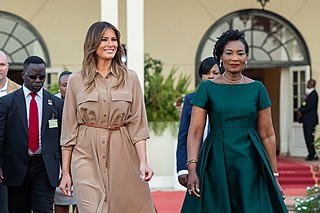
Traditional healers of Southern Africa are practitioners of traditional African medicine in Southern Africa. They fulfill different social and political roles in the community, including divination, healing physical, emotional and spiritual illnesses, directing birth or death rituals, finding lost cattle, protecting warriors, counteracting witchcraft, and narrating the history, cosmology, and concepts of their tradition. There are two main types of traditional healers within the Nguni, Sotho-Tswana, and Tsonga societies of Southern Africa: the diviner (sangoma), and the herbalist (inyanga). These healers are effectively South African shamans who are highly revered and respected in a society where illness is thought to be caused by witchcraft, pollution or through neglect of the ancestors. It is estimated that there are as many as 200,000 traditional healers in South Africa compared to 25,000 doctors trained in bio-medical medicine. Traditional healers are consulted by approximately 60% of the South African population, usually in conjunction with modern biomedical services. = For harmony between the living and the dead, vital for a trouble-free life, traditional healers believe that the ancestors must be shown respect through ritual and animal sacrifice. They perform summoning rituals by burning plants like imphepho, dancing, chanting, channelling or playing drums. Traditional healers will often give their patients muti—medications made from plant, animal and minerals—imbued with spiritual significance. These muti often have powerful symbolism; for example, lion fat might be prepared for children to promote courage. There are medicines for everything from physical and mental illness, social disharmony and spiritual difficulties to potions for protection, love and luck.

HIV/AIDS originated in Africa in the early 20th century and is a major public health concern and cause of death in many African countries. AIDS rates vary dramatically although the majority of cases are concentrated in Southern Africa. Although the continent is home to about 15.2 percent of the world's population, more than two-thirds of the total infected worldwide – some 35 million people – were Africans, of whom 15 million have already died. Sub-Saharan Africa alone accounted for an estimated 69 percent of all people living with HIV and 70 percent of all AIDS deaths in 2011. In the countries of sub-Saharan Africa most affected, AIDS has raised death rates and lowered life expectancy among adults between the ages of 20 and 49 by about twenty years. Furthermore, the life expectancy in many parts of Africa is declining, largely as a result of the HIV/AIDS epidemic with life-expectancy in some countries reaching as low as thirty-nine years.

The Chewa are a Bantu ethnic group native to central and southern Africa and the largest ethnic group in Malawi. The Chewa are closely related to people in surrounding regions such as the Tumbuka and Nsenga. They are historically also related to the Bemba, with whom they share a similar origin in the Democratic Republic of the Congo. As with the Nsenga and Tumbuka, a small part of Chewa territory came under the influence of the Ngoni, who were of Zulu or Natal/Transvaal origin. An alternative name, often used interchangeably with Chewa, is Nyanja. Their language is called Chichewa. Internationally, the Chewa are mainly known for their masks and their secret societies, called Nyau, as well as their agricultural techniques.
Thomas John Bisika is a social demographer and public health specialist, diplomat, and former health systems specialist at World Health Organization in Nigeria.He is the current Malawi High Commissioner to the United Kingdom.

The transition from a one-party state to a multi-party democracy significantly strengthened the already cordial U.S. relationship with Malawi. Significant numbers of Malawians study in the United States. The United States has an active Peace Corps program, Centers for Disease Control and Prevention, Department of Health and Human Servicess, and an Agency for International Development (USAID) mission in Malawi. Both countries have a common history and English language, as they were part of the British Empire.

Doug Karr is a French-Canadian film director. Karr currently owns and operates Pie Face Pictures production company in New York City.

As of 2012, approximately 1,100,000 people in Malawi are HIV-positive, which represents 10.8% of the country's population. Because the Malawian government was initially slow to respond to the epidemic under the leadership of Hastings Banda (1966–1994), the prevalence of HIV/AIDS increased drastically between 1985, when the disease was first identified in Malawi, and 1993, when HIV prevalence rates were estimated to be as high as 30% among pregnant women. The Malawian food crisis in 2002 resulted, at least in part, from a loss of agricultural productivity due to the prevalence of HIV/AIDS. Various degrees of government involvement under the leadership of Bakili Muluzi (1994–2004) and Bingu wa Mutharika (2004–2012) resulted in a gradual decline in HIV prevalence, and, in 2003, many people living in Malawi gained access to antiretroviral therapy. Condoms have become more widely available to the public through non-governmental organizations, and more Malawians are taking advantage of HIV testing services.

HIV and AIDS is a major public health issue in Zimbabwe. The country is reported to hold one of the largest recorded numbers of cases in Sub-Saharan Africa. According to reports, the virus has been present in the country since roughly 40 years ago. However, evidence suggests that the spread of the virus may have occurred earlier. In recent years, the government has agreed to take action and implement treatment target strategies in order to address the prevalence of cases in the epidemic. Notable progress has been made as increasingly more individuals are being made aware of their HIV/AIDS status, receiving treatment, and reporting high rates of viral suppression. As a result of this, country progress reports show that the epidemic is on the decline and is beginning to reach a plateau. International organizations and the national government have connected this impact to the result of increased condom usage in the population, a reduced number of sexual partners, as well as an increased knowledge and support system through successful implementation of treatment strategies by the government. Vulnerable populations disproportionately impacted by HIV/AIDS in Zimbabwe include women and children, sex workers, and the LGBTQ+ population.
ICAP at Columbia University's Mailman School of Public Health supports programs and research that address HIV/AIDS and related conditions and works to strengthen health systems. ICAP currently supports HIV/AIDS prevention, care and treatment programs in 19 African countries including: Angola, Cameroon, Côte d'Ivoire, Democratic Republic of Congo, Ethiopia, Kenya, Lesotho, Malawi, Mali, Mozambique, Namibia, Sierra Leone, South Africa, South Sudan, Swaziland, Tanzania, Uganda, Zambia, and Zimbabwe. It also works in Central Asia, Ukraine, Georgia, Myanmar, Brazil, Guatemala, China, Jordan, Lebanon, and Turkey. ICAP supports several hundred project sites, which provide HIV prevention, care and treatment to hundreds of thousands of individuals.

Traditional African medicine is a range of traditional medicine disciplines involving indigenous herbalism and African spirituality, typically including diviners, midwives, and herbalists. Practitioners of traditional African medicine claim to be able to cure a variety of diverse conditions including cancer, psychiatric disorders, high blood pressure, cholera, most venereal diseases, epilepsy, asthma, eczema, fever, anxiety, depression, benign prostatic hyperplasia, urinary tract infections, gout, and healing of wounds and burns and even Ebola.
The virgin cleansing myth is the belief that having sex with a virgin girl cures a man of HIV/AIDS or other sexually transmitted diseases.
John Lloyd Chipembere Lwanda is a Malawian medical doctor, writer, poet, researcher, publisher, and music producer. He is a published author and also a publisher of books and music. He was an honorary senior lecturer at the University of Glasgow Department of Primary Care until 2005. Lwanda did his history and social science PhD at the University of Edinburgh's Centre of African Studies.
Sam Mpasu was a Malawian politician, author, and former diplomat. He served as Minister of Commerce, Secretary General of the United Democratic Front (UDF) in 1999, and speaker of the Malawi National Assembly.
Witchcraft accusations against children in Africa have received increasing international attention in the first decade of the 21st century.
Lucy Finch is a palliative nurse who has worked in several African countries and founded a hospice in Malawi – Ndi Moyo – "the place giving life".

Between Rings: The Esther Phiri Story is a documentary film co-written and co-directed by Zambian filmmaker Jessie Chisi and Finnish director Salla Sorri. The film is about Esther Phiri, Chisi's cousin, who left her education and prospect of marriage to embark on a boxing career, and became seven-time world welterweight champion.
Traditional and Modern Health Practitioners Together against AIDS(THETA) is a non-government organization in Uganda that promotes collaboration between traditional healers and biomedical practitioners to prevent the spread of HIV/AIDS and provide care for HIV-positive patients. It was seen to be the first significant effort in Africa to involve traditional healers in the efforts against HIV/AIDS.
Traditional and Modern Health Practitioners Together Against AIDS(THETA) is a non-government organization in Uganda that promotes collaboration between traditional healers and biomedical practitioners to prevent the spread of HIV/AIDS and provide care for HIV-positive patients. It was seen to be the first significant effort in Africa to involve traditional healers in the efforts against HIV/AIDS.
Isabel Apawo Phiri is a Malawian theologian known for her work in gender justice, HIV/AIDS, and African theology. She has been a Deputy Secretary for the World Council of Churches since 2012.
Fulata Lusungu Mbano Moyo is a Malawian systematic and feminist theologian who is an advocate for gender justice.








